#SS Charlemagne
Explore tagged Tumblr posts
Text
suddenly obsessed with the idea that charle moves like a stop motion character and im making it canon
#` ooc || move bitch im 𝙂𝘼𝙔 `#` 🜏 someday we'll find our rainbow connection || charlemagne. `#( im thinking more laik.a styled- maybe she was more rankin ba/ss when she was younger )#( JHBJDSF )#( it just makes sense bc shes a bjd )
1 note
·
View note
Text
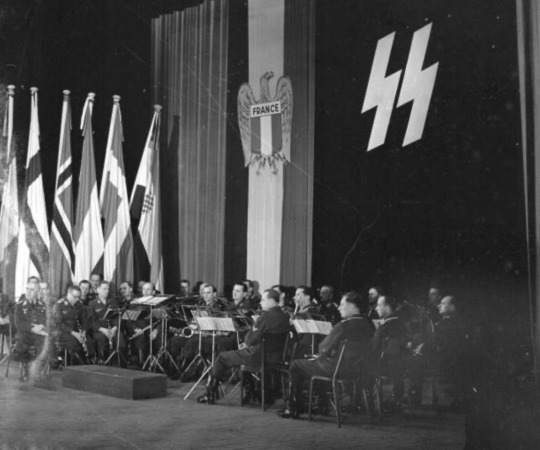
Members of the 33rd Waffen Grenadier Division of the SS Charlemagne the French volunteer corps preforming at an award ceremony
84 notes
·
View notes
Note
Did any Vichy French units fight alongside the Nazis during Overlord?
The severely-limited Armistice Army was disbanded in 1942 during Fall Anton, after the Allies landed in French Algeria. So there was no official Vichy French army to fight alongside the Nazis. There were French volunteers for the SS such as the Charlemagne Legion, who were some of the final holdouts in the Battle of Berlin. There were other French people that volunteered for the Wehrmacht. There were a few French conscripts from German-speaking parts of Alsace-Lorraine, the Malgré-nous. But official Vichy France army units ceased to exist in November 1942.
Thanks for the question, Cle-Guy.
SomethingLikeALawyer, Hand of the King
82 notes
·
View notes
Text

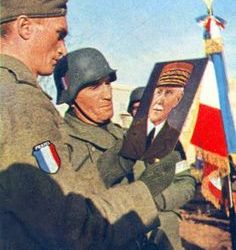

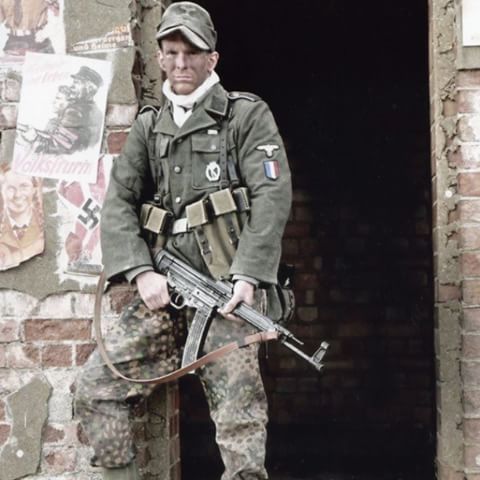
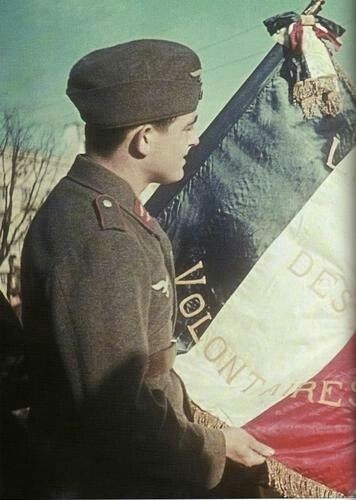
Waffen-Grenadier-Brigade der SS "Charlemagne"
37 notes
·
View notes
Text
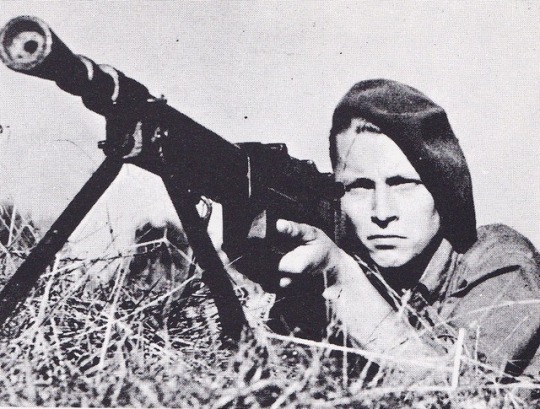
Oberjunker “Prinz” Serge Protopopoff, born in Paris from Russians parents who escaped Russia and the bolshevik revolution, he fought during the battle of Berlin with the French SS Division Charlemagne, Protopopoff destroyed five enemy tanks in the battle, and was killed in April or May 1945.
6 notes
·
View notes
Text

Des troupes au sol en Ukraine ? Pas question: l’OTAN, l’Allemagne et la Pologne recadrent Macron
«Ce qui a été convenu dès le début entre nous et les uns avec les autres vaut également pour l'avenir», a rectifié le chancelier Scholz.
«A savoir qu'il n'y aura pas de soldats sur le sol ukrainien envoyés par des Etats européens ou des Etats de l'OTAN.»
«Il n'est pas prévu de stationner des troupes de combat de l'OTAN en Ukraine», a aussi rétropédalé (https://apnews.com/) le secrétaire de l’OTAN, Jens Stoltenberg.
Et pour compléter le tout, la porte-parole russe Maria Zakharova a ajouté (https://t.me/MariaVladimirovnaZakharova/7162):
«Emmanuel, avez-vous décidé de monter une division SS Charlemagne (https://fr.wikipedia.org/wiki/33e_division_SS_Charlemagne) II (*Charlemagne deux) pour défendre le bunker de Zelensky?»
Je voudrais vous rappeler qu'il y a à peine un mois, le ministre français des Affaires étrangères avait nié l'implication de Paris dans le recrutement de mercenaires pour le régime de Kiev et avait qualifié des preuves directes de «propagande russe grossière».
*En français dans le texte.
3 notes
·
View notes
Text
In the real world Charlemagne imposed capital punishment for witch-hunters. 0785 AD, Council of Paderborn. Look it up.
He imposed this penalty because Saxon pagans had regular massacres over witchcraft accusations.
Congratulations on being exactly the opposite of correct. And, by the way, repeating a narrative popularized by Heinrich Himmler, head of the Nazi SS.
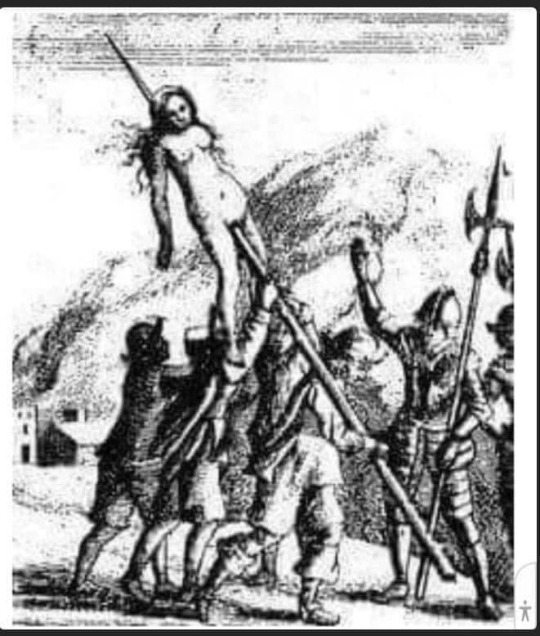
This is just a reminder of how Christianity became so popular today.*
During the reign of Charlemagne, women were impaled on sharpened poles put in the vagina.
Slowly, over days, the pole would travel the length of the body through the organs, causing tremendous pain, simply because a woman was found collecting herbs in the forest. She was labelled a witch.
Their screams could be heard for days as an example to those who would not accept the foreign faith. Christianity became so popular because of sheer terror of what would happen if it wasn't accepted
2K notes
·
View notes
Text
En ce 8 mai, plus que jamais : pas de capitulation, racisme à outrance, tout pour la victoire aryenne totale !
1945 est un incident regrettable sur la voie de notre inévitable domination.

Désolé Abdul, tous mes ancêtres étaient racistes
Le 8 mai est la journée officielle de l’antifascisme, mais surtout de l’antiracisme puisque ce qui est « célébré » est la défaite de l’Allemagne nationale-socialiste dont le péché cardinal est le « racisme » — sous entendu le racisme blanc — et qu’avec cette défaite, ce sont bien les Blancs, comme entité historique consciente d’elle-même et douée d’une volonté d’agir, qui a « perdu ».
S’il faut donc célébrer « la défaite des Nazis », en toute logique, il faut également célébrer le résultat tangible de cette défaite : la présence de 60 millions d’allogènes dans une Europe de 450 millions d’habitants. Bref, toute la foultitude des nègres, bicots, bistres à pédigrée incertain de tous les horizons, qui souillent notre continent de leur présence, de leurs déprédations, de leurs sales gueules.
Que les gouvernements, églises, loges, partis démocratiques ou marxistes (c’est pareil), et toute la masse des ahuris conditionnés par près d’un siècle de propagande antifa se félicitent, c’est attendu et cohérent. En revanche, ce qui l’est moins, c’est de voir s’en féliciter les faisans qui capitalisent sur les conséquences désastreuses de la défaite (momentanée) de la race blanche menée par l’Allemagne nationale-socialiste, et ce pour complaire à la juiverie fauteuse de guerre.
Il y a cet arrière-goût d’urée, très désagréable, qui ne passe pas.

Et je le rappelle : l’inéligibilité de Mariama est une bénédiction divine.

Les droitardés ne se surpassent jamais autant qu’à l’heure de passer pour des couillons qui n’ont rien bité au seul film qui compte.
Ils ont exactement 80 ans mentalement.
Nous, nous avons 20 ans pour toujours.
Il y a un devoir de refus catégorique de cette soumission, et ce d’autant plus que la guerre contre l’Allemagne nationale-socialiste, qui n’était qu’une bataille dans la guerre globale et totale contre la race blanche, se poursuit et qu’elle se poursuivra tant que l’homme blanc, le « raciste », n’aura pas définitivement disparu de la surface de la terre.
Vous voilà prévenu !
Et oui : nul besoin d’être nazi pour l’être, il suffit d’être blanc et de ne pas vouloir disparaître en tant que tel dans la bouillie multiraciale démocratique.
Dire non au cirque démocratique, à l’antiracisme, à la religion de l’holocauste, instrument de la culpabilité (mensongère) de la race blanche, se rebeller, n’est pas qu’une question de principe, mais bien une question de vie ou de mort : sans envoyer ce fatras bouler, c’est la fosse commune pour les Blancs de tous les pays.
Que ça plaise ou pas, pas de survie sans réhabilitation du national-socialisme et d’Adolf Hitler, génie colossal, héros central d’une tragédie qui continue de se jouer.
Rappelons-nous donc de nos morts, pas de ceux des autres.
Le 8 mai 1945 est surtout l’occasion de nous rappeler des combattants volontaires français de la division SS « Charlemagne », lâchement fusillés après s’être rendus réglementairement, sur ordre de l’infâme Leclerc, à Bad Reichenhall, en Bavière, à quelques kilomètres de Berchtesgaden.

Le récit des faits est narré par Metapedia :
Le 29 avril 1945, après que les survivants de la 38ème SS Panzergrenadierdivision Nibelungen eurent tenté de bloquer le passage des ponts sur l’Amper et Isar aux forces armées américaines, près de Moosburg, une partie du bataillon de la division Charlemagne affecté à cette division fut dispersée et beaucoup se rendirent aux troupes américaines. Avec d’autres prisonniers allemands, 12 Français sont prisonniers dans une caserne de Bad Reichenhall. Le 6 mai 1945, la 2e Division blindée de Leclerc occupe la ville. Les Waffen SS français essayèrent alors de s’échapper par crainte de représailles, sachant parfaitement que leurs compatriotes allaient les considérer comme des traîtres. Ils sont finalement capturés dans une forêt voisine, encerclés par deux compagnies françaises, et seront fusillés. L’exécution eut lieu le 8 mai 1945 vers 17 heures, donc quelques heures avant l’entrée en vigueur du cessez-le-feu général, dans une petite clairière jouxtant le chemin de Kugelbach, sur le territoire de la commune de Karlstein, limitrophe de la petite ville de Bad Reichenhall, en Haute Bavière, non loin de l’Obersalzberg. Les polémiques sont encore vives de nos jours quant aux responsables de cette exécution. Le père Gaume, un ancien missionnaire au Dahomey, fut témoin de l’exécution. Il fournit le témoignage suivant à la famille de l’une des victimes. « Après que parvint de l’état-major de la division l’ordre de fusiller les prisonniers, le père Fouquet, aumônier de la division, me confia la mission de les assister dans leurs derniers moments. Le jeune lieutenant qui commandait le peloton d’exécution n’appartenait pas à mon unité et je ne le connaissais pas. Très affecté par l’ordre reçu, il se demanda s’il ne devait refuser; tourmenté par sa conscience, il voulait faire son possible pour rendre aux hommes leur dernière heure moins pénible et partagea avec eux la communion avant l’exécution. Le peloton d’exécution fut constitué par une autre unité et les douze hommes furent conduits à Karlstein. L’un des prisonniers refusa l’assistance de l’Église, trois autres déclarèrent n’avoir pas de dernier message à transmettre à leur famille. Parmi les autres il y en eut au moins un qui demanda à sa famille de pardonner au peloton d’exécution. L’exécution se fit en trois étapes de quatre hommes à chaque fois. Tous refusèrent de se laisser bander les yeux et moururent en criant « vive la France »; parmi les derniers se trouvaient le lieutenant Briffaut et le grenadier W-SS Pavras. Selon les ordres reçus, je laissai les cadavres sur le sol et me tournai vers des soldats américains allongés à proximité et leur ordonnai d’enterrer les morts, ce qu’ils firent quelques jours plus tard ».
S’ajoute un autre témoignage :
Le témoignage suivant fut fait par le père Fouquet, l’ancien aumônier de la 2e DB : « L’ordre de l’exécution fut donné à l’état-major de la division par un officier dont j’ignore le nom suite à un coup de téléphone avec le général Leclerc. Les membres de la « Charlemagne » ayant eu une attitude particulièrement arrogante envers un officier qui leur avait reproché d’avoir mis l’uniforme des « boches », ils lui répondirent que celui-ci se sentait lui aussi bien dans l’uniforme des Américains ! Selon le complément d’enquête se trouvaient parmi les douze prisonniers certains qui venaient de l’hôpital; une photo permet d’identifier la fiche d’évacuation qui selon l’usage dans la Wehrmacht était fixée à la boutonnière. Ils s’étaient rendus sans combattre aux Américains qui les enfermèrent avec d’autres prisonniers allemands dans la caserne des chasseurs alpins de Bad Reichenall. Ayant appris que leurs gardiens devaient être remplacés par des troupes françaises, ils décidèrent de s’évader; ils réussirent en traversant la clôture de la caserne et à se réfugier dans un bois à proximité, mais leur évasion fut découverte et ils furent peu après encerclés par deux compagnies de la 2ème DB et ramenés sous bonne escorte l’après-midi. Le 8 mai ils furent transportés par camion à Karlstein, c’est-à-dire sur la route qui mène à Kugelbach. Quand ils surent qu’on s’apprêtait à leur tirer dans le dos, ils protestèrent énergiquement. Ils eurent le droit de se mettre debout et face au peloton d’exécution. Les cadavres restèrent effectivement sur place et ne furent enterrés que trois jours plus tard par des soldats américains. Un prêtre militaire américain était présent à cette occasion et bénit les morts. Aussitôt on planta sur les tombes des croix de bois avec les noms des fusillés. Ces noms disparurent par la suite ».
Voici la liste des volontaires identifiés, coupables de s’être portés sur le front de l’Est pour résister à l’assaut bolchevique contre l’Europe :
SS-Obersturmführer Serge Krotoff, né le 11.10.1911 en Russie et membre de la communauté « anti-bolchévique » des Russes Blancs exilés en France. Officier vétéran de la marine marchande française, il commandait la compagnie anti-char du Bataillon léger de la Charlemagne.
SS-Untersturmführer Paul Briffaut, né le 08.08.1918 à Nice, officier de la LVF, démobilisé de la Brigade Charlemagne en décembre 1944 suite à des blessures, après avoir commandé la compagnie de canon du W-Gren Rgt der SS 58.
SS-Untersturmführer Robert Doffat, 37 ans, autrefois vétéran du 3ème Bataillon de la LVF, qui avait été assigné à l’état-major du groupe d’artillerie divisionnaire.
SS-Grenadier Jean Robert, né le 01.02.1915 à Nantes, issu de la LVF.
SS-Grenadier Raymond Payras, 22 ans, de Touget (Gers).
SS-Mann Jacques Ponnau (grade exact inconnu), il fut identifié en 1979, à partir d’une photo des victimes de Karlstein prise avant leur assassinat.
Mais les dieux sont espiègles.
La hyène gaulliste Leclerc ne survécut pas longtemps à ce crime. En 1947, son avion se mangea une dune fatale en pleine Algérie ! L’Algérie, le pays qui fera crever la France juive d’une overdose de musulmans, était déjà l’instrument du châtiment divin contre ses séides !
En ce 8 mai, rappelons-nous des 12 martyrs de Bad Reichenhall et de l’exemple qu’ils donnent aux combattants blancs d’aujourd’hui et de demain.
Voir ou revoir « La division Charlemagne jusqu’à Berlin » d’Ulfric d’Alsace pour se rappeler qui était du « bon côté ».
Et, comme de juste, plus que jamais et à jamais, Heil Hitler !
Démocratie Participative
0 notes
Text
Events 1.25 (before 1940)
41 – After a night of negotiation, Claudius is accepted as Roman emperor by the Senate. 750 – In the Battle of the Zab, the Abbasid rebels defeat the Umayyad Caliphate, leading to the overthrow of the dynasty. 1327 – Fourteen-year-old Edward III ascends the throne of England after his father the king is forced to abdicate by Queen Isabella and her lover, Roger Mortimer. 1348 – A strong earthquake strikes the South Alpine region of Friuli in modern Italy, causing considerable damage to buildings as far away as Rome. 1479 – The Treaty of Constantinople ends the 16-year-long First Ottoman–Venetian War. 1494 – Alfonso II becomes King of Naples. 1515 – Coronation of Francis I of France takes place at Reims Cathedral, where the new monarch is anointed with the oil of Clovis and girt with the sword of Charlemagne. 1533 – Henry VIII of England secretly marries his second wife Anne Boleyn. 1554 – São Paulo, Brazil, is founded by Jesuit priests. 1573 – Battle of Mikatagahara: In Japan, Takeda Shingen defeats Tokugawa Ieyasu. 1576 – Luanda, the capital of Angola, is founded by the Portuguese navigator Paulo Dias de Novais. 1585 – Walter Raleigh is knighted, shortly after renaming North America region "Virginia", in honor of Elizabeth I, Queen of England, sometimes referred to as the "Virgin Queen". 1704 – The Battle of Ayubale results in the destruction of most of the Spanish missions in Florida. 1755 – Moscow University is established on Tatiana Day. 1765 – Port Egmont, the first British settlement in the Falkland Islands near the southern tip of South America, is founded. 1787 – Shays' Rebellion: The rebellion's largest confrontation, outside the Springfield Armory, results in the killing of four rebels and the wounding of twenty. 1791 – The British Parliament passes the Constitutional Act of 1791 and splits the old Province of Quebec into Upper Canada and Lower Canada. 1792 – The London Corresponding Society is founded. 1819 – University of Virginia chartered by Commonwealth of Virginia, with Thomas Jefferson one of its founders. 1858 – The Wedding March by Felix Mendelssohn is played at the marriage of Queen Victoria's daughter, Victoria, and Friedrich of Prussia, and becomes a popular wedding processional. 1879 – The Bulgarian National Bank is founded. 1881 – Thomas Edison and Alexander Graham Bell form the Oriental Telephone Company. 1890 – Nellie Bly completes her round-the-world journey in 72 days. 1909 – Richard Strauss's opera Elektra receives its debut performance at the Dresden State Opera. 1915 – Alexander Graham Bell inaugurates U.S. transcontinental telephone service, speaking from New York to Thomas Watson in San Francisco. 1917 – Sinking of the SS Laurentic after hitting two German mines off the coast of northwest Ireland. 1918 – The Ukrainian People's Republic declares independence from Soviet Russia. 1918 – The Finnish Defence Forces (The White Guards) are established as the official army of independent Finland, and Baron C. G. E. Mannerheim is appointed its Commander-in-Chief. 1924 – The 1924 Winter Olympics opens in Chamonix, in the French Alps, inaugurating the Winter Olympic Games. 1932 – Second Sino-Japanese War: The Chinese National Revolutionary Army begins the defense of Harbin. 1932 – Alt Llobregat insurrection suppressed in Central Catalonia, Spain. 1937 – The Guiding Light debuts on NBC radio from Chicago. In 1952 it moves to CBS television, where it remains until September 18, 2009.
0 notes
Text
Additional information : Marine Le Pen's party doesn't only have a history of antisemitism, it was funded in part by a SS at the beginning.
Yes I will take any occasion to remind everyone. It was. Funded. By. A. SS. Of the Charlemagne division.
And on the radio I heard people who claimed to be Jewish praising her for her stance.
11 notes
·
View notes
Text
Arrêtez, avec votre ''grand remplacement''. C'est un mythe
Il serait temps d'arrêter de radoter : le suicide multiculturel de l'Europe n'est pas pour demain. Cette vision-catastrophe d'un Zemmour qui joue sur la peur n'est qu'une impression (ça doit être vrai : c'est notre garde des Sots qui le dit !), une idée fixe pour cerveaux rétrogrades hantés par des fantasmagories populistes. Et pourtant... le cas de l'Allemagne, où la pensée est plus libre et la vérité bien moins interdite qu'en France, démontre que si le suicide de ce pays proche n'est pas pour demain, c'est parce qu'il est... pour aujourd'hui ! Avec ce qui se passe à Roubaix (aussi) ce qui est réalité rive droite du Rhin pourrait être impression rive gauche ?
On dit qu’il faut être impitoyable avec (contre !) ceux qui abusent de la tolérance des progressistes pour saper les règles de l'État de Gauche et du stupide ‘’vivre ensemble mais dos à dos'', ceux qui propagent des doctrines anti-doxa et une vision de la liberté d'expression qui se heurte à la règle socialo-masochiste et sélective du ''pas d'amalgame’’, dont le ''mantra'' est : Tout le monde a le droit d'exprimer librement son opinion, tant qu’elle n'est pas contraire à la charia'a... Oui, mais le jour où le barrage cédera, qui va courir le plus vite ? Ceux qui disent que le raz-de-marée qui arrive est un réel danger... ou ceux pour cette vague folle n'est qu'une ''impression de violence'' ? Quand les faux beaux esprits de la ''Bêtisentzia rose foncé'' --version up-to-woke de l'ex-intelligentzia rouge-- disent que le ''Grand Remplacement'' et l'islamisation de l'Europe relèvent des théories d’un complot populiste, ont-ils imaginé à quoi pourrait peut-être ressembler l'Europe, demain ?
Il y a seize ans, SS. Benoît XVI, lors de sa première visite papale à Cologne, avait invité ''la jeunesse d'Europe à revenir à ses racines''. Un an plus tard, à Ratisbonne, il nous mettait en garde contre la violence intrinsèque de l'islam. Et pourtant... le 4 novembre 2021, l'Allemagne a signé une capitulation face à l'islam politique, à Cologne, où les mosquées de la ville ont obtenu d'utiliser les haut-parleurs de leurs minarets pour lancer les appels à la prière du vendredi, sous le prétexte que ''de nombreux habitants sont musulmans, et qu'autoriser l'appel du muezzin est un signe de respect '', dixit Henriette Reker, maire de Cologne.... alors que ou même si, pour l"immense majorité des 1,5 million de ''Kölner'', l'appel islamique à la prière représente un cri de conquête, celui que les chrétiens du Moyen-Orient et d'Afrique subissent cinq fois par jour jusque dans leurs églises et leurs maisons. Mais les écolos progressouillo-dévastateurs ont pris la ''Rathaus'' (vraiment devenue ''la maison des rats'' !) ! Et ‘’Au diable... les préférences des blancs’’ ! Ah ! Mais....
Et tant pis si la plupart des mosquées d'Allemagne sont financées (directement ou indirectement) par le gouvernement turc, via le Millî Görüş, et donc contrôlées par Erdogan, ivre de sa haine contre les valeurs de l'Occident et la démocratie, et qui répète à qui veut l'entendre (= tous nos leaders progressistes !) que ''L'hégémonie occidentale, c'est terminé. Ça a duré des siècles, mais c'est fini''... C'est donc sur suggestion du Diyanet Isleri Başkanliği (le Département de Affaires religieuses turc) que Marcel Philipp, maire d'Aix-la-Chapelle, veut sa "Moscheeplatz" (= Place de la Mosquée), dans la ville de Charlemagne et du Saint Empire Romain Germanique.
Peu après Cologne, le Land de Hesse a proclamé que les appels publics à la prière pouvaient se dispenser d'autorisation, après qu'un tribunal ait autorisé une mosquée de Münster à appeler à grands cris à la prière le vendredi, ''comme huit des plus grandes villes d'Allemagne'', dit Der Spiegel. A Munich depuis avril 2020, les cinq mosquées ont été autorisées à faire usage de leurs haut-parleurs. Et à Hanovre (27 mosquées !) les autorités ont déclaré que ''L'appel du muezzin ne nécessite pas d'autorisation'', et Dortmund, Hamm, Siegen, Düren et Oldenburg ont également autorisé l'appel sonore à la prière islamique, tout comme Nüremberg...
Gottfried Leibnitz, le grand penseur, mathématicien et philosophe allemand, disait : ''Tout est pour le mieux dans le meilleur des mondes possibles''... d'autant mieux que de nombreuses villes allemandes peuvent compter jusqu'à 70 % de migrants. ''Souvent, les musulmans sont plus nombreux que les chrétiens'' se plaignait le 16 novembre dernier dans Die Welt Thomas Jühe, un député social-démocrate. Malte Kaufmann, député de Cologne au Bundestag, écrit : ''Il n'y a pas d'islamisation de l'Allemagne ? Sauf que chaque vendredi, il n'y a pas d'autre dieu qu'Allah ! Cela fait des années qu'on lance des alertes ! Petit à petit, l'Occident chrétien est trahi. C'est une capitulation''. ''Si on accepte les cloches, alors on doit également dire ‘’Oui’’ au muezzin'', a même déclaré SE le cardinal Rainer Maria Woelki, cet archevêque de Cologne... qui mériterait le surnom de ''Mohamed'', qu’avait reçu Mgr Léon Duval, l'Archevêque d'Alger au temps des bombes tueuses de pieds-noirs par le FLN.
Il n'est d'ailleurs pas exclu que l'Eglise allemande, imitant celle des Pays Bas, ait décidé de se suicider. L'archidiocèse de Cologne --le plus grand d'Allemagne et l'un des plus riches du monde-- va réduire le nombre de paroisses de 500 à 50, d'ici 2030, pendant que Erdogan s'est rendu à Cologne pour inaugurer la plus grande mosquée d'Allemagne (6000 places). Il a été accueilli par Angela Merkel, fille d'un pasteur prussien, et au nom d'un ''dialogue interreligieux'' à sens unique, l'église catholique Saint-Théodore de Cologne a contribué au financement de cette super-mosquée, donc à l'islamisation de la ville... En remerciement, Erdogan a aussitôt transformé en mosquée la sublimissime basilique byzantine de Sainte-Sophie, une des merveilles du monde depuis le Vè siècle. En Occident, personne n’a bougé !
L'ancien président de la Cour constitutionnelle Rhénanie-Nord-Westphalie, Michael Bertrams voit là un ''triomphe politique'' pour le président turc, et Hamed Abdel-Samad, sociologue qui vit sous protection policière à cause de fatwas, est encore plus net : ''L'appel à la prière commence par 'Allahu Akbar', le cri de ralliement des musulmans et des islamistes, qui dit qu'Allah est plus grand que les peuples, que la vie... et plus grand que l'Allemagne. Et puisque Allah est plus grand que tout, la seule loi qui peut et doit s'appliquer est la charia'a'', réputée être ‘’la Loi d’Allah’’.
Pour le maire de Francfort, ''La liberté religieuse est protégée par la Constitution, et la loi ne prévoit pas d'autorisation pour la prière du muezzin, ni pour les cloches d'église''... ce qui est idiot : il n'y a aucun parallèle possible entre ces deux choses. Là où le muezzin crie 'Allah est grand !' et 'Je proclame qu'il n'y a de Dieu qu'Allah', les cloches des églises carillonnent gaiement et indiquent l'heure, mais si certains entendent entre les ding et les dong que le même message serait sous-entendu, disant le dieu des Chrétiens serait le seul Dieu véritable, c'est subliminal au point d’être fantasmé ! Entre ces deux ‘’chants’’, pas la moindre comparaison possible !
Susanne Schröter, professeur d'ethnologie à l'Université Goethe de Francfort, affirme que pour les musulmans, ces appels à la prière sont le signe du triomphe de l'islam fort sur un christianisme faible : le croissant de l'islam remplacera bientôt les étoiles sur le drapeau de l'Union européenne. Pour Thilo Sarrazin (souvent cité, ici), ex-président de la banque centrale d'Allemagne et auteur de best-sellers politiques, ce qui se passe à Cologne est en phase syntone avec l'avenir démographique de l'Allemagne : ''La population allemande (...) va s'éteindre de toute façon avant un siècle, ce que l'adaptation opportuniste des politiques aux cris des muezzins à Cologne illustre parfaitement, hélas. Et Thilo Sarrazin ajoute : ‘’En France, Michel Houellebecq a envoyé le même message, dans un livre à succès, '’Soumission''.
Le plus grave est sans doute que l'aveuglement de nos élites et leur déni de toute réalité ne laisse que très peu (ou pas !) d'espoir : ''Si la France est le pays de l'agression islamiste, l'Allemagne est le pays de la capitulation devant l’islam, et il serait sage de vous préparer à ''votre muezzin quotidien'', comme Stockholm, Londres, Bruxelles, Amsterdam, avertit le polémiste Henryk Broder dans Die Welt . ''Le suicide culturel (mais pas que...) de l'Europe n'est pas pour demain'' disions-nous dans l'introduction de ce billet. C'est exact : Il est pour... hier.
H-Cl
7 notes
·
View notes
Note
Why did Hitler want to talk to General Steiner so badly?
Are you talking about the much-memed scene in Downfall?
Steiner was in charge of the defense in northern Berlin during the Battle of Berlin. Hitler's plans were for Steiner to join up with Wenck's forces and establish a breakout with the reinforcements from SS Division Charlemagne. Much like Hitler's Endseig or the expected breakout in the Ardennes Counter-Offensive (the German name for the Battle of the Bulge). Army Group Steiner, however, was largely incapable of doing so, at this point missing manpower and equipment.
Thanks for the question, Anon.
SomethingLikeALawyer, Hand of the King
14 notes
·
View notes
Text
Events 10.9 (before 1920)
768 – Carloman I and Charlemagne are crowned kings of the Franks. 1238 – James I of Aragon founds the Kingdom of Valencia. 1410 – The first known mention of the Prague astronomical clock. 1446 – The Hangul alphabet is published in Korea. 1594 – Troops of the Portuguese Empire are defeated on Sri Lanka, bringing an end to the Campaign of Danture. 1604 – Kepler's Supernova is the most recent supernova to be observed within the Milky Way. 1635 – Roger Williams is banished from the Massachusetts Bay Colony after religious and policy disagreements. 1701 – The Collegiate School of Connecticut (later renamed Yale University) is chartered in Old Saybrook. 1708 – Peter the Great defeats the Swedes at the Battle of Lesnaya. 1740 – Dutch colonists and Javanese natives begin a massacre of the ethnic Chinese population in Batavia, eventually killing at least 10,000. 1760 – Seven Years' War: Russian and Austrian troops briefly occupy Berlin. 1790 – A severe earthquake in northern Algeria causes severe damage and a tsunami in the Mediterranean Sea and kills three thousand. 1799 – HMS Lutine sinks with the loss of 240 men and a cargo worth £1,200,000. 1804 – Hobart, capital of Tasmania, is founded. 1806 – Prussia begins the War of the Fourth Coalition against France. 1812 – War of 1812: In a naval engagement on Lake Erie, American forces capture two British ships: HMS Detroit and HMS Caledonia. 1820 – Guayaquil declares independence from Spain. 1825 – Restauration arrives in New York Harbor from Norway, the first organized immigration from Norway to the United States. 1831 – Ioannis Kapodistrias, the first head of state of independent Greece, is assassinated. 1834 – Opening of the Dublin and Kingstown Railway, the first public railway on the island of Ireland. 1847 – Slavery is abolished in the Swedish colony of Saint Barthélemy. 1861 – American Civil War: Union troops repel a Confederate attempt to capture Fort Pickens at the Battle of Santa Rosa Island. 1864 – American Civil War: Union cavalrymen defeat Confederate forces at Toms Brook, Virginia. 1873 – A meeting at the U.S. Naval Academy establishes the U.S. Naval Institute. 1874 – The Universal Postal Union is created by the Treaty of Bern. 1900 – The Cook Islands become a territory of the United Kingdom. 1911 – An accidental bomb explosion triggers the Wuchang Uprising against the Qing dynasty, beginning the Xinhai Revolution. 1913 – The steamship SS Volturno catches fire in the mid-Atlantic. 1914 – World War I: The Siege of Antwerp comes to an end. 1918 – The Finnish Parliament offers to Prince Frederick Charles of Hesse the throne of a short-lived Kingdom of Finland. 1919 – The Cincinnati Reds win the World Series, resulting in the Black Sox Scandal.
0 notes
Text

French General Leclerc inspecting a group of captured French volunteers of the Waffen-SS Charlemagne division. He firmly admonished them for wearing the uniform of a foreign nation, to which one prisoner responded by reminding Leclerc that he himself was wearing an American uniform.
The prisoners were executed by firing squad without trial the following day. All were denied blindfolds. As one last act of defiance the prisoners shouted "vive la France!" as their last words.
This angered Leclerc, who ordered that their bodies be left unburied.
They were then buried by US troops three days later.
May, 1945
3 notes
·
View notes
Text
En février 1943, déterminé à participer à la lutte contre le communisme sur le front de l'Est, Jean-Marie Croisile signe son engagement au sein de la Légion des volontaires français contre le bolchevisme. Un choix qui le conduira plus tard à intégrer la 33e Division SS Charlemagne avec laquelle il participera à la défense de Berlin. À l'automne 1943, c'est au tour de son jeune frère, Alain Croisile, puis de leur père, Jean Croisile, de signer un engagement au sein de la Waffen-SS. À la lumière de l'histoire, il s'agit d'un choix indéfendable qui les conduira à la fin de la guerre à affronter la Haute Cour de Justice de Colmar pour avoir « sciemment accompli des actes de nature à nuire à la défense nationale. » Au vu de l'histoire familiale, il s'agit d un choix d'autant plus incompréhensible que le père, Jean Croisile, est un ancien héros de la guerre de 1914-1918, cinq fois blessé dans les combats, dont trois fois à Verdun, mais aussi un vétéran de la campagne de 1940 au cours de laquelle il s'est encore battu vaillamment contre l'ennemi allemand. « Je puis assurer, en toute conscience, que malgré nos pauvres moyens matériels, j'ai toujours résisté face à l'ennemi, de toutes mes forces, et s'il y avait eu en France plus de résistants à ce moment-là [mai 1940], il est bien certain que les événements auraient pris une tout autre tournure », déclarait d'ailleurs Jean Croisile aux jurés chargés de le juger en 1945. Construit autour du récit inédit de Jean-Marie Croisile, et complété par différentes recherches qui permettent de retracer le parcours de cette famille depuis les années 1900 jusqu'à son procès devant la Haute Cour de Justice de Colmar, Sous uniforme allemand dévoile pour la première fois, sans romantisme ni emphase, ce que fut le cheminement complet de ces hommes qui firent le choix d'aller combattre sur le front de l'Est et la réalité de ce qu'ils vécurent.
Jean Marie Croisille - Sous uniforme allemand
2 notes
·
View notes
Text
Today the [European Court of Justice] remains, of all Union institutions, the most withdrawn from the public. Discreetly situated in Luxembourg, not exactly a European crossroads, and composed of judges appointed – one per country – by member states, its proceedings are hidden from public scrutiny; its decisions permit no admission of dissent; its archives grant minimal access to researchers. In modus operandi, the ECJ is the antithesis of the US Supreme Court, whose emoluments it comfortably tops – its president receives a salary worth $400,000, plus many allowances; the chief justice in Washington a measly $277,000. Its origins date back to the first stage of integration: the European Coal and Steel Community (ECSC) born of the Schuman Plan was endowed with a Court of Justice that was rolled forward into the European Economic Community set up by the Treaty of Rome five years later, and then into the European Union created at Maastricht.
Thanks to the pioneering work of a young historian from Luxembourg, Vera Fritz, we now have a detailed scholarly study of the composition of the court in the first twenty years of its existence. Her findings are illuminating. There were seven founding judges and two advocates-general. Who were they? The Italian president of the court, Massimo Pilotti, had been deputy secretary-general of the League of Nations in the 1930s. There he acted as the long arm of the fascist regime in Rome, advising Mussolini on what counter-measures to take to shield Italy from condemnation by the League for its actions in Ethiopia. On resigning his post in 1937, Pilotti took part in the celebrations in Genoa of the conquest of Ethiopia; and during the Second World War headed the high court of occupied Ljubljana after Italy’s annexation of Slovenia, where resistance was met with mass deportations, concentration camps, and police and military repression. The German judge on the court, Otto Riese, was so devoted a Nazi that without any duress – he spent the war as an academic in Switzerland – he retained his membership of the NSDAP until 1945. His compatriot Karl Roemer, an advocate-general to the court, spent the war in occupied Paris managing French companies and banks for the Third Reich; after the war, he married Adenauer’s niece, and acted as defence lawyer for the Waffen SS charged with responsibility for the massacre of the occupants of the French village of Oradour. The other advocate-general, Maurice Lagrange, was a senior functionary in the Vichy government, fully committed to the ideology of a ‘National Revolution’ to sweep away the legacy of the Third Republic. Acting as link-man between the judicial apparatus of the Conseil d’État and the political apparatus of the Council of Ministers, Lagrange was in charge of co-ordinating the first wave of persecution of French Jews. When Laval took over the reins of Vichy in 1942, transferring Lagrange back to the Conseil d’État, Pétain thanked him for his ‘rare perseverance’ in the regime’s legislative and administrative work, to which Lagrange replied that ‘for me it has been a great privilege to be so closely associated with the enterprise of national renovation you have undertaken for the salvation of our country. I am convinced that every Frenchman can and should take part in this work.’ After the war he was chosen by the Americans to help democratise the civil service in Germany, and by Monnet to help draft the treaty establishing the Coal and Steel Community.
That figures like these were the ornaments of Europe’s first Court of Justice reflected, of course, the closing of political ranks after the Cold War set in, when what mattered was not the misdeeds of the fascist past but the menace of communist present. It was a time when the last commander of the Charlemagne Division of the SS, fighting to the last bullet to defend Hitler in his bunker, could emerge as best choice for the Robert Schuman Prize for services to European unity. Why should European justice too not let bygones be bygones?
From Perry Anderson, “Ever Closer Union?” London Review of Books, January 7, 2021.
15 notes
·
View notes